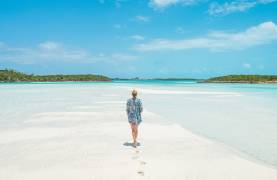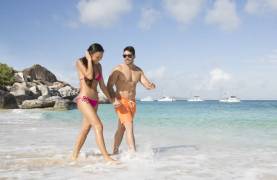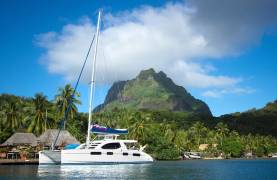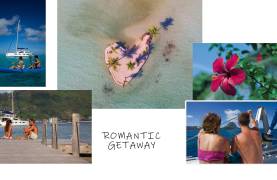
Editor’s Note: This week’s post was written by guest author Erik Westgard of St. Paul, Minnesota, who shares the highlights of his travels in Corfu, Greece after sailing the Mediterranean with The Moorings. A full version of Erik’s charter holiday recap can be found in the August 2016 issue of Blue Water Sailing.
Wikipedia says Greece has “an extremely large number of islands” in the range of 6000, with 1200 or so large enough to be habitable. You can spend happy days paging through Rod Heikell’s excellent coffee-table size guidebook, Greek Waters Pilot, and lose yourself in all the choices of beautiful harbors. For those new to Greek chartering, however, the big question is—where do you even begin?
Organizing your trip around an existing charter base makes this simple. The Moorings offers three bases in Greece. If you are looking for outstanding food, sailing and interesting port visits any one is a good choice. Athens (Zea) is easy to get to and has excellent winds and open water sailing conditions. For beginners, I might suggest either Corfu, or Lefkas in the popular Northern Ionian. We just got back from Corfu, and would go again in a minute.
Second largest in the Ionian, the island of Corfu has an interesting history and is very popular with British tourists. There is a strong connection because Britain ruled the island from 1815-1864 and Prince Philip, Duke of Edinburgh, was born there. The base is housed at the large (1200 boats) and well-appointed Gouvia Marina, a bit north of Corfu Town.

Corfu Town, with dual fortresses is a must-see. The 1546 era Old Fort is a museum, has a nice café with a great view and even a yacht marina, which can be used as a stop on your voyage. The town has two more marinas and several nice churches as well as excellent shopping. We liked lunch outdoors at the Aegeli Restaurant, on the Liston, which was built in 1807 by the French Imperial Commissioner to resemble the Rue de Rivoli in Paris. It overlooks the attractive main square. The New Fort, until recently an active military facility, is also open for visitors.
Kalami was personally recommended by Johnny and Emily from the base as a nice and easy first stop to anchor in. We instead chose to leave the boat at Gouvia to get over jet lag and intensively tour the area by taxi.
Mourtos, Sivota gave us a chance to Med Moor, and I made a good approach to the wall and forgot to tell the crew to drop the anchor. Luckily, they did it anyway at the perfect time. We found nice spots to the left of the ferry dock. We also met two Scottish gentlemen who helped us tie up, handed us beer and strongly advised an excellent Italian place (Mediterraneo) just a few blocks inland, which had a wood fired pizza oven. This was next to an art gallery and bakery, and near a small supermarket. We were told it was good to move the boat away from the wall another foot or two and bring in our boarding planks at night, to protect the boat from any ferry surge, which we actually felt at 5am.
Lakka on Paxos is an area that was highly rated by my crew, and with good reason. The harbor was nice and sheltered, and the scenery was just stunning. There are some pristine beaches located here for you to enjoy a leisurely stroll on the soft Mediterranean sand.

Gaios was fairly full on the outside main wall when we arrived, even though it was quite early in the day. You can also moor to a section of that wall painted yellow from 5 PM to 10AM only, when the tour boats are gone for the day. Another anchoring option is to try the compact inner harbor where there are some places to run a line to shore.
Mongonisi is well-sheltered and has a classy little bar as well as showers, a large taverna, and (possibly shallow) mooring wall. There is some grass in the bay but it is very secluded and tropical feeling. There is great hiking, some interesting rock formations in the nearby hills, and kayak and paddle board rentals. It is a few kilometers by path over to Gaios Town. We were entertained by Greek music and dancing in the taverna.
Parga, back on the mainland, is amazing. On the left, there is a large bay and beaches, which are protected from the prevailing northerly. In the center there is a charming fort (with cafe), and to the right sits a compact harbor for ferries and fishing boats. We found a spot by the breakwater and set out a lot of chain. The crew assembled on deck and waited for the water taxi, which when we were there in early season ran from about 3PM to 1130PM or so.
The main road leads up the fort, and is lined with shops and tavernas, each with the most amazing view. The town looks just like Portofino, Italy, seen on so many postcards. We had a lovely dinner at Avra, which gets at least five stars. There is enough to do in Parga for several days at least, including grocery shopping. The water taxi carried jugs of diesel and water and the quality and flavor of the local vegetables was quite impressive.
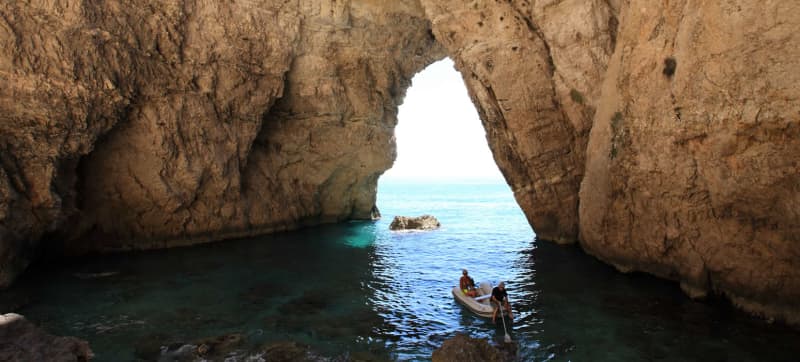
By way of general advice before a Corfu charter holiday, you need to be prepared for smiling people, beautiful scenery and excellent food. Prices were low and English was widely spoken. Mooring balls, lazy lines and marinas are uncommon, so you will need to Med Moor. Practice, including backing the boat and coordinating your crew with fenders and lines is key. Charterers must study the charts, as underwater hazards are not marked. Be respectful of the ferries, which follow a strict commercial schedule. And finally, be mindful of the weather forecast because strong winds can appear with little notice.
Contributor
Leslie Montenegro
Step Aboard Here
Start your experience with The Moorings on land and sign up to receive e-mails from us about yachts, offers and destinations.
By clicking 'Sign up' you confirm that you have read and understood our Privacy Policy and consent to our use of your information.

